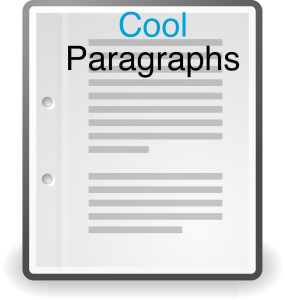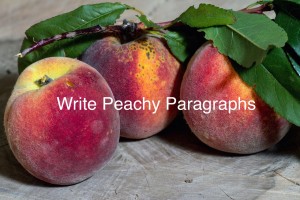“I huff and puff and struggle with every sentence, paragraph and page – sometimes every word as well.” — Aidan Chambers
Ask these 6 questions about your paragraphs. I’ll use the following paragraph as an example.
1Before the fateful telephone call, Ella put cut up peaches on a baking sheet. 2She thought Cal would be glad she’d made dried peaches this winter when he ate them. 3She opened the oven door, after the she checked that the oven was up to the low heat needed, and put the baking sheet in. 4She heard her cell on the counter go off. 5She thought it was Cal calling. 6He was probably ready for her to drive over to the school and pick him up. 7She answered her cell.
Question 1: Will the reader feel as if she’s inside the character’s point-of-view?
- When the author mentions the future fateful call (sentence 1), he takes us out of Ella’s point of view and lessens our later surprise.
- He also intrudes and tells us that Ella thinks (2 & 5) and hears (4). In her point-of-view, Ella would simply think and hear.
Question 2: Have you varied opening-sentence words, and do you end sentences with words that give readers a sense of the sentences’ meaning?
- Five sentences start with she. Repetitive.
- Each ending word in sentences 2, 3, 4, and 6 leave the reader with no gist of the sentences’ meanings (them, in, off, up).
Question 3: Are actions ordered as Ella experiences them?
- In Ella’s point of view, she couldn’t know yet that a fateful phone call would soon occur (1).
- We learn Ella checked whether the oven was up to heat, after she opened the oven door (3).
Question 4: Does too much action description slow the pace?
- Do we need to know Ella checked the heat and opened the door (3)? These actions say too much about putting peaches in the oven and slow the story.
Question 5: Can you find better descriptive words and reduce wordy phrases?
- Drab verbs: be, ate (2); put (4); and go (4)
- Wordiness: would be glad, when he ate them (2); up to the low heat needed, go off (4); and to drive over to the school (6).
Question 6: Are sentences confusing?
- Does sentence 2 mean Cal will be glad this winter, or did Ella make the dried fruit this winter?
A Better Rewrite:
Ella arranged peach slices on a baking sheet. Cal would appreciate her efforts when he snacked on the sweet dried fruit during cold winter days. As she slid the sheet into the oven, her cell on the counter played its jazzy tune. Maybe that was Cal, ready to come home from football practice. She wiped sticky juice from her hands and grabbed the phone.
Note:
- Arranged, appreciate, slid, played, and grabbed are strong verbs.
- Opening-sentence words are varied.
- Baking sheet, winter days, jazzy tune, football practice, and phone all leave us with an aspect of what the sentences are about.
- The author never intrudes, and we’re in the “now” in Ella’s thoughts and actions.
- The upbeat actions and descriptions will increase the impact of the “fateful call.”
- The unedited paragraph is 90 words. The second is 64 with more colorful description.
Use these 6 questions to polish dull paragraphs. Click to tweet.
Can you improve the rewrite?






 RSS - Posts
RSS - Posts



Good information, Zoe. I printed this post for a reference.
Thanks, Marcia, glad it helped.